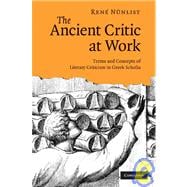
The Ancient Critic at Work: Terms and Concepts of Literary Criticism in Greek Scholia
- ISBN13: 9780521850582
- ISBN10: 0521850584
- Edition: 1st
- Format: Hardcover
- Copyright: 2009-04-20
- Publisher: Cambridge University Press
Note: Supplemental materials are not guaranteed with Rental or Used book purchases.
-
Your order must be $35 or more to qualify for free economy shipping. Bulk sales, PO's, Marketplace items, eBooks and apparel do not qualify for this offer.








